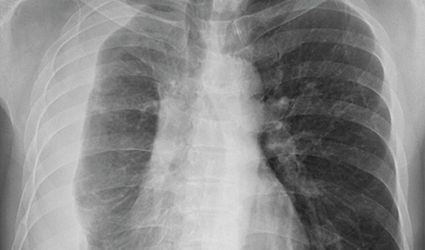Score Predicts Risk of Death in Malignant Pleural Effusion
August 12, 2018
Source: MDEdge
 738
738

A study published online in The Lancet Oncology showed a score integrating clinical and biological markers which could help foresee the chance of mortality in patients with malignant pleural effusion and their probability of benefiting from pleurodesis.
The researchers used five distinct and autonomous datasets from three previous multicenter randomized controlled trials – TIME-1, TIME-2, and TIME-3 – to pick 17 individuals for biomarkers of survival at 3 months and 7 individuals for biomarkers of pleurodesis success at 3 months.
They merged these with clinical, radiological, and biological variables to formulate the clinical PROMISE model, which incorporated relative protein expression of tissue inhibitor of metalloproteinases 1, platelet-derived growth factor, vascular endothelial growth factor, cadherin 1 and interleukin 4. The pleurodesis dataset comprised tumor necrosis factor alpha, TNF-beta, interleukin 6, and fibroblast growth factor 2.
External validation was done using complete case data from 162 individuals with malignant pleural effusion, about one-third of whom had died before 3 months.
Depending on prognostic factors, they also designed a biological model for survival, counting use of previous chemotherapy and radiotherapy, baseline ECOG performance status, cancer type, hemoglobin, and white blood cell count.
The researchers observed that the PROMISE scores presented “good discrimination,” and derived from that, they created four categories – A, B, C, and D, each naming less than 25% risk, 25%-49% risk, 50%-74% risk, and 75% or more risk of death by 3 months. The biomarkers linked with pleurodesis results could not be validated.
“All parameters included in the PROMISE score are independently associated with survival, and thus the identified markers permit some speculation as to their biological role in survival in malignant pleural effusion,” wrote Ioannis Psallidas, MD, of the Oxford Centre for Respiratory Medicine at Oxford (England) University Hospital, and his coauthors.
By DduRead more on
- Things to Know before Buying Newborn Baby Incubators March 31, 2022
- Highly Resistant Food Poisoning Bug Responds to Antibiotics September 6, 2018
- Smartphone Based Diagnosis to Identify Mosquitoes Transmitting Infection September 5, 2018
- 3 Natural Plant Extracts Manufacturers on Drugdu.com September 4, 2018
- Shenzhen Chuanggan – Health Assessment Facility Supplier September 4, 2018
your submission has already been received.
OK
Subscribe
Please enter a valid Email address!
Submit
The most relevant industry news & insight will be sent to you every two weeks.



